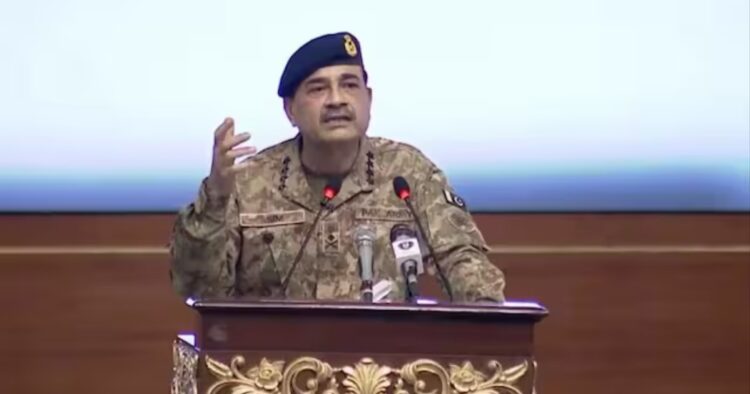KEY POINTS
- Munir claims Pakistanis are completely different from Hindus, reviving the two-nation theory
- Indian officials say his speech aims to incite radicals and distract from Pakistan’s internal failures
- Timing of remarks linked to India’s Waqf Act amendment to stir communal unrest
In a recent address, Pakistan Army Chief General Asim Munir claimed that Pakistanis are completely different from Hindus in every way, in religion, customs, traditions, ambitions, and thoughts. He once again pushed the outdated and controversial two-nation theory, saying that this belief was the foundation of Pakistan’s creation. However, according to top Indian government sources, Munir’s speech was nothing but an attempt to spread communal hatred and divert attention from Pakistan’s own internal failures.
According to Indian officials who spoke to CNN-News18, Munir’s speech was not just offensive but part of a larger strategy. They say he wants to unite radical elements, terrorists, and extremists against India. His goal? To rally Muslim communities against Hindus, and to create the illusion of a religious war, one that benefits Pakistan’s military by distracting the public from problems like inflation, corruption, and insurgency in places like Balochistan.
Experts point out that Munir’s comments come just as India amended the Waqf Act. Indian sources believe this timing was not a coincidence. By referring to the Waqf changes, Munir is trying to create communal tension in India, especially among Muslims in India and Bangladesh, hoping to trigger unrest or violence. His words are not based on any real concern, they are carefully planned to damage India’s image internationally.
In his speech at the Overseas Pakistanis Convention in Islamabad, Munir called on Pakistanis living abroad to tell their children that they are different from Hindus and must never forget the “story of Pakistan.” He repeated claims that Pakistanis had to fight hard to separate from Hindus, ignoring the fact that millions on both sides of the border still share history, culture, and language. Instead of promoting peace and progress, Munir is pushing hatred that divides.
Indian intelligence officials have also said that Munir’s narrative is aimed at reviving and encouraging terror groups like Lashkar-e-Taiba and Jaish-e-Mohammed, by making it seem like Muslims are under threat from Hindus. This, they say, is dangerous and shows Munir’s desperation. Rather than helping Pakistan rise out of its crisis, he is playing with fire, hoping to increase violence and tension in the region.
Munir also falsely accused India of “illegally occupying Kashmir” and tried to compare Pakistan’s situation with that of Palestinians in Gaza. This, Indian sources say, is a clear attempt to gain sympathy from the global Muslim community and to give himself an image of being a “defender of Muslims”, even though his own army has been accused of serious human rights violations in Balochistan and other areas.
In the same speech, Munir vowed to crush the Balochistan Liberation Army (BLA), Baloch Republican Army (BRA), and other local resistance groups. But analysts say that his hate-filled words about India are also meant to shift the focus away from the Pakistani Army’s failure to resolve the decades-long crisis in Balochistan. Thousands have died or disappeared in the region, and the government continues to face strong resistance from locals demanding freedom or autonomy.
While addressing overseas Pakistanis, Munir praised their dedication to the nation but made no mention of the economic collapse, rising debt, and diplomatic isolation Pakistan is facing. Instead, he chose to speak about war, sacrifice, and fighting “enemies”, even when the biggest enemy for Pakistan today is poor governance, not India.

















Comments